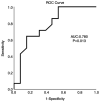Characteristics and outcomes of elderly patients with Parkinson's disease hospitalized due to COVID‑19‑associated pneumonia
- PMID: 37448768
- PMCID: PMC10336924
- DOI: 10.3892/mi.2023.94
Characteristics and outcomes of elderly patients with Parkinson's disease hospitalized due to COVID‑19‑associated pneumonia
Abstract
Patients with Parkinson's disease (PD) and coronavirus disease 2019 (COVID-19)-associated pneumonia present, according to the literature, high mortality rates due to the nature of the disease, advanced age, and underlying diseases. Most available studies, however, refer to the first waves of the pandemic. The aim of the present study was to investigate the clinical characteristics and outcomes of elderly patients (≥65 years old) with PD hospitalized with COVID-19-associated pneumonia during the period of prevalence of various severe acute respiratory syndrome coronavirus 2 (SARS-CoV-2) variants, as well as to determine possible prognostic factors for poor outcomes. During the period from February 15, 2021, to July 15, 2022, 1,144 elderly patients with COVID-19 pneumonia were hospitalized. Age, sex, Charlson comorbidity index, vaccination status against SARS-CoV-2, and admission laboratory parameters were recorded for all patients. A total of 36 (3.1%) patients with PD were hospitalized due to COVID-19-associated pneumonia (18 males, 50%). The mean age of the patients was 82.72±8.18 years. In total, 8 patients (22.2%) were hospitalized during the period of alpha variant predominance, 3 patients (8.3%) during the period of delta variant predominance, and 25 patients (69.4%) during the omicron variant predominance period. Of note, 16 patients (44.4%) were vaccinated with at least two doses. In addition, 17 (47.2%) patients succumbed to the disease. Between the patients who survived and those who succumbed, a statistically significant difference was only found in the mean value of albumin (37.48±6.02 vs. 31.97±5.34 g/l, P=0.019). In particular, as shown by receiver operating characteristic curve analysis, albumin exhibited a satisfactory predictive ability for mortality (area under the curve, 0.780; P=0.013) with an albumin value ≤37.7 g/l being able to predict mortality with 85.7% sensitivity and 54.8% specificity. Overall, the findings of the present study indicate that mortality among elderly patients with PD hospitalized with COVID-19-associated pneumonia was high in all phases of the pandemic. A low albumin value, not only as an indicator of the immune status, but also of the nutritional status, is a predictor of adverse outcomes.
Keywords: Parkinson's disease; albumin; coronavirus disease 2019; mortality; pneumonia.
Copyright: © Georgakopoulou et al.
Conflict of interest statement
The authors declare that they have no competing interests.
Figures
References
-
- Frontera JA, Sabadia S, Lalchan R, Fang T, Flusty B, Millar-Vernetti P, Snyder T, Berger S, Yang D, Granger A, et al. A prospective study of neurologic disorders in hospitalized patients with COVID-19 in New York City. Neurology. 2021;96:e575–e586. doi: 10.1212/WNL.0000000000010979. - DOI - PMC - PubMed
LinkOut - more resources
Full Text Sources
Miscellaneous

